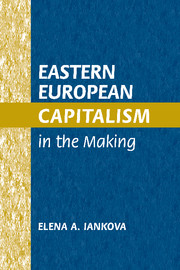Book contents
- Frontmatter
- Contents
- Acknowledgments
- List of Abbreviations
- 1 Hybrid Capitalism in the Making
- 2 The Corporatist Legacy of State Socialism
- 3 Bulgaria's National Tripartism
- 4 National Social Dialogue in Poland
- 5 The Politics of Sectoral Tripartism
- 6 The Politics of Regional Tripartism
- 7 Conclusions: Transiency and Continuity
- Tables
- References
- Index
4 - National Social Dialogue in Poland
Published online by Cambridge University Press: 30 July 2009
- Frontmatter
- Contents
- Acknowledgments
- List of Abbreviations
- 1 Hybrid Capitalism in the Making
- 2 The Corporatist Legacy of State Socialism
- 3 Bulgaria's National Tripartism
- 4 National Social Dialogue in Poland
- 5 The Politics of Sectoral Tripartism
- 6 The Politics of Regional Tripartism
- 7 Conclusions: Transiency and Continuity
- Tables
- References
- Index
Summary
Negotiated Extrication from State Socialism
Unlike the other postcommunist countries, Poland had a history of prolonged and painful resistance to the communist regime. While other countries experienced only occasional eruptions of mass discontent and attempts to radically reform the system, Poland was regularly shaken by such events. In 1956, 1968, 1970, 1976, and, especially, 1980—81, the rationales for Polish communism were challenged by the masses and, increasingly, also by reformist elites. The roots of Poland's pioneering exit from state socialism should be sought in the legacy of these numerous initiatives of a united civil society (Kolankiewicz and Lewis 1988; Poznanski 1996; Ekiert 1998). Poland's extremely strong, unitary, and politically militant civil society was able to weaken the whole Soviet bloc in the 1980s and provide other countries in the region with a path-breaking example of how to effect the peaceful collapse of a communist regime.
The events of 1980–81 broadened the cracks within the Soviet empire. Especially after Gorbachev initiated a process of liberalization in the form of glasnost and perestroika in 1985, the Soviet empire could no longer be propped up by military means, and Solidarity could fully realize the opportunities stemming from the corporatist concessions of 1981. Initially, however, in accordance with the requirements of the 1982 Trade Union Act, the official All-Poland Trade Union Alliance (OPZZ) emerged between 1982 and 1984, while Solidarity remained underground.
- Type
- Chapter
- Information
- Eastern European Capitalism in the Making , pp. 92 - 122Publisher: Cambridge University PressPrint publication year: 2002



